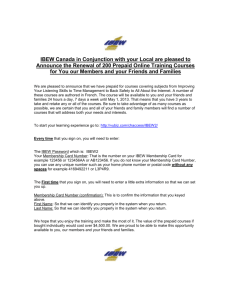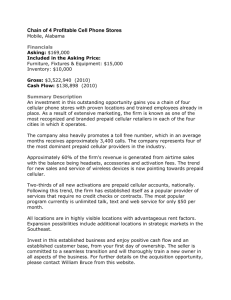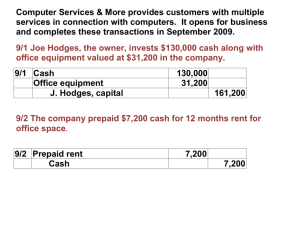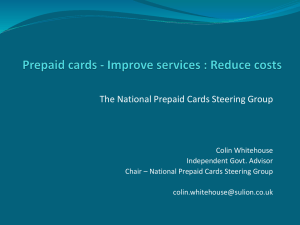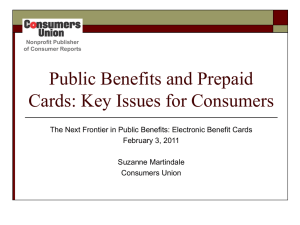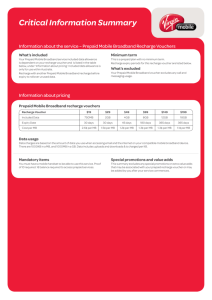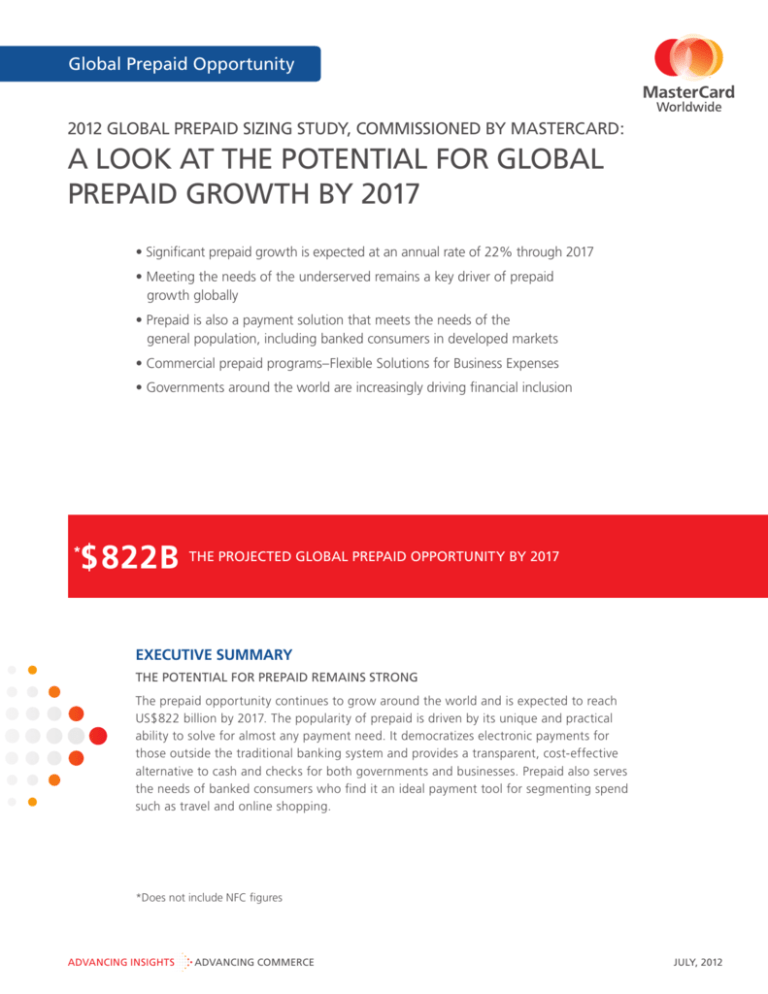
Global Prepaid Opportunity
2012 GLOBAL PREPAID SIZING STUDY, COMMISSIONED BY MASTERCARD:
A LOOK AT THE POTENTIAL FOR GLOBAL
PREPAID GROWTH BY 2017
• Significant prepaid growth is expected at an annual rate of 22% through 2017
• Meeting the needs of the underserved remains a key driver of prepaid
growth globally
• Prepaid is also a payment solution that meets the needs of the
general population, including banked consumers in developed markets
• Commercial prepaid programs–Flexible Solutions for Business Expenses
• Governments around the world are increasingly driving financial inclusion
$822B
*
THE PROJECTED GLOBAL PREPAID OPPORTUNITY BY 2017
EXECUTIVE SUMMARY
THE POTENTIAL FOR PREPAID REMAINS STRONG
The prepaid opportunity continues to grow around the world and is expected to reach
US$822 billion by 2017. The popularity of prepaid is driven by its unique and practical
ability to solve for almost any payment need. It democratizes electronic payments for
those outside the traditional banking system and provides a transparent, cost-effective
alternative to cash and checks for both governments and businesses. Prepaid also serves
the needs of banked consumers who find it an ideal payment tool for segmenting spend
such as travel and online shopping.
*Does not include NFC figures
ADVANCING INSIGHTS
ADVANCING COMMERCE
JULY, 2012
Global Prepaid Opportunity
2012 MASTERCARD GLOBAL PREPAID MARKET SIZING STUDY
Forward-Looking Statements
The information presented in this document is intended solely for
informational purposes and not as individually-tailored advice or specific
recommendations for any particular action or investment and should
not be relied upon, in whole or in part, as the basis for decision-making
or other purposes. This document contains, in addition to historical
information, forward-looking statements within the meaning of the Private
Securities Litigation Reform Act of 1995, which are based on current data,
assumptions, and expectations about future events which reflect the best
judgment of The Boston Consulting Group and involve a number of risks
and uncertainties that could cause actual results to differ materially from
those suggested by these materials. You should review and consider the
information contained in our filings with the SEC regarding these risks
and uncertainties. All information contained herein, including all forecasts,
projections or indications of financial opportunities, are provided on an
"as is" basis. You are solely responsible for your use of this information, as
well as any decisions made or actions taken in response to such information
and MasterCard disclaims any obligation to publicly update or revise any
forward-looking statements or information provided in this document.
Methodology
The 2012 Global Prepaid Sizing Study, looking at 35 countries and 20
verticals, was developed utilizing a robust and tested methodology. The
study begins by defining 20 distinct and mutually exclusive verticals, which
together capture the full set of Gross Dollar Volume (GDV) spend in each
geographic market reviewed. The next phase is to determine a vertical size,
calculating the total payment flows through each vertical (e.g., corporate
payroll is all money flows to working individuals in a certain country) through
rigorous sets of foundational data from central banks, government censuses
and economic databases. Then, determination is made for the maximum
penetration or product ceiling that prepaid could reach within the vertical
(e.g., total unbanked and underbanked populations in a certain country).
Talking with a wide range of experts in the field, leveraging secondary
research and utilizing internal data, the study then identifies the current
vertical GDV for the baseline year. The study's proprietary model projects out
the GDV for each year between the baseline and 2017 based on the expected
growth curve. After the model projections are completed, a series of data
sense checks are performed – including detailed bottoms up program level
build ups per vertical and country, extensive data triangulation and feedback
loops with a wide range of prepaid experts – before the study is completed.
Note: All charts and graph information supplied, unless otherwise indicated,
are by Boston Consulting Group, January 2012.
ADVANCING INSIGHTS
ADVANCING COMMERCE
2
Global Prepaid Opportunity
The potential for prepaid remains strong
The market for open loop prepaid cards is projected to grow at an annual rate of 22%
through 2017. Corporate Payroll, Government Benefits, and General Use are projected to
continue leading the market in 2017 representing 63% of the global open loop opportunity.
$177
CAGR
2010
2017
27%
Europe
$28 B
16%
US
$421 B
US
$152 B
Europe
$149 B
billion
26%
MEA
$46 B
37%
LAC
$15 B
$152
51%
%
MEA
$3 B
billion
Government
Benefits
38%
Canada
$19 B
billion
Corporate Payroll
ESTIMATED OPEN LOOP PREPAID GROWTH (2010-2017)
Canada
$2 B
$191
AP
$10 B
General Purpose
Reloadable
AP
$54 B
LAC
$133 B
$56
billion
While the U.S. market continues to present the largest opportunity, the rest of the world is
accelerating at a rapid pace. In fact, by 2017 we expect to see a more balanced global share,
with the rest of the world representing almost half of the global open loop opportunity.
Consumer Travel
$55
billion
2010
2017
U.S. 421
Healthcare
Account
ROW 148
17%
USA
73%
ROW
27%
CAGR
ROW 32%
USA 16%
51%
KSA/UAE 13
Russia 16
Canada 19
32%
India 23
Top five product
categories projected
to represent 77% of
the overall prepaid
opportunity in 2017
U.K/Ireland 31
Italy 41
Mexico 46
Brazil 65
Total: $210 B
Total: $822 B
In addition to the U.S., eight markets are expected to play a key role in driving the growth of
prepaid through 2017: Brazil, Mexico, Italy, U.K./Ireland, India, Canada, Russia and KSA/UAE.
ADVANCING INSIGHTS
ADVANCING COMMERCE
3
Global Prepaid Opportunity
Meeting the needs of the underserved remains a key driver of
prepaid growth globally
With no banking relationship or credit check required, prepaid cards have
the potential to bring the safety and convenience of electronic payments
1
to many of the world’s over 2.5 billion underserved adults. In emerging
markets, driven by distrust of financial institutions, lack of affordable banking
options, and unavailability of banking infrastructure, underserved individuals
transact in cash and receive wages and government benefits outside of
the banking system. In developed markets, high banking fees, lack of
steady income, and the availability of alternative financial services such as
check cashing and walk-in bill pay facilities all serve to encourage financial
exclusion. For many consumers, this is the costly and inefficient reality.
Companies are driving financial inclusion—whether mandated by the
government or motivated by sound business judgment—by converting
cash and checks to electronic payouts for their underbanked employees.
This is driving the Corporate Payroll opportunity which is projected to
reach $191 billion globally by 2017. Prepaid cards enable both commercial
and government entities to increase financial inclusion while reducing
processing costs and carbon footprint and increasing efficiency and risk
management. The increasing availability of General Purpose Reloadable
(GPR) cards at retail POS further adds to the migration of cash to electronic
payments and gives underserved populations the ability to shop and pay
bills online, remit funds home where local laws allow, and even earn
rewards and savings otherwise reserved for banked individuals.
PERCENT OF ADULTS WHO LACK ACCESS TO FINANCIAL SERVICES BY REGION1
Central Asia & Eastern Europe
193 million adults
High-income OECD countries
60 million adults
(Members of Organization for Economic
Co-operation and Development)
East Asia,
Southeast Asia
876 million adults
49%
59%
8%
South Asia
612 million adults
25.6%
U.S. households
(close to 30 million)
that are either
unbanked or
underbanked
Source: FDIC National
Survey of Unbanked
and Underbanked
Households, 2009
45%
The compounded
annual growth rate
(2010-2017) for
corporate payroll
prepaid cards in
UAE largely driven
by the UAE Ministry
of Labour Decree
that requires all
business institutions
registered with
the Ministry of
Labour to transfer
salaries of all
their employees
through the Wages
Protection System
(WPS)
58%
Latin America
250 million adults
Middle East
136 million adults
65%
67%
Sub-Saharan Africa
326 million adults
80%
Total
2,455 million adults
53%
1
McKinsey and Financial Access Initiative, Half the World is Unbanked, October 2009
ADVANCING INSIGHTS
ADVANCING COMMERCE
4
Global Prepaid Opportunity
Prepaid also meets the needs of the general population, including
banked consumers in developed markets
The growth in the prepaid opportunity is not attributed solely to meeting the needs of
the underserved. In fact, approximately 48% of the global open loop opportunity lies
within the general population driven by a new attitude towards money management
among banked consumers who are looking to segment their spend on top of their
existing payment cards.
2017 TOP PROJECTED PRODUCT CATEGORIES FOR GENERAL POPULATION NEEDS
Open Loop GDV ($B)
$56
Consumer Travel
$55
Healthcare Accounts
$25
Online
$23
Consumer Incentive
The percent of
the total European
consumer prepaid
opportunity that
is projected to be
driven by online
shopping or
e-commerce
$395
billion
$31
Gift
16%
Prepaid remains a smart cash and check replacement for mass market categories
such as meal vouchers and transit as well as a complementary light banking product
for banked consumers, giving them a bank account in their pocket. This is especially
relevant for Europe where a large amount of the population is banked.
The projected 2017
prepaid opportunity
to serve the specific
needs of the
general population
Further, an increased focus on budgeting and security for both travel and online
payments has elevated the relevance of prepaid among banked consumers who
want to segregate their spending for better control. For travelers seeking a safer
alternative to cash and a more convenient alternative to travelers checks, prepaid
satisfies the needs of both leisure and business travelers. Additionally, technology,
innovation and adoption especially in mobile are presenting unprecedented
opportunities for prepaid. Depending on the market, these opportunities can
further extend the attractiveness of prepaid to banked customers.
2017 ESTIMATED OPEN LOOP CONSUMER TRAVEL GDV BY MAJOR MARKET
Open Loop GDV ($B)
U.S.
15.4
U.K./Ireland
7.5
Germany
4.5
Brazil
4.2
Australia
France
Canada
Russia
2.9
2.7
2.1
1.8
ADVANCING INSIGHTS
ADVANCING COMMERCE
5
Global Prepaid Opportunity
Commercial prepaid programs–Flexible Solutions
for Business Expenses
Whether replacing paychecks, meal vouchers or healthcare reimbursements,
prepaid creates efficiencies, transparency and employee satisfaction. With
a prepaid card, companies–both small businesses and large enterprises–
have a cost-effective, efficient solution to replace antiquated paper-based
payments and that allows them to more effectively control business
spending and create a better experience for their employees.
This includes the distribution of employee benefits and compensation such
as payroll, healthcare, employee incentives and vouchers, as well as other
business payments (i.e., consumer rebates, insurance claims payments).
Prepaid also helps to deliver better compliance, reduce fraud and increase
employee and customer satisfaction.
Unlike cash and checks, prepaid offers enhanced spend control features
as well as tracking and reporting capabilities. It also complements credit
and debit products and is suitable for all employees–no need to extend a
credit line or give a card to an employee who may not otherwise qualify
for a credit or debit product because of their job function, credit status or
location. Prepaid is also environmentally friendly as it greatly reduces the
amount of paper necessary.
Given this, it is not surprising that the total commercial prepaid opportunity
is projected to experience a significant growth in the next few years,
reaching $325 billion globally by 2017.
Corporate payroll comprises the largest segment of this category,
projected to total $191 billion. In 2010, corporate payroll was estimated
at $33 billion–this represents a CAGR of 26%, higher than the overall
prepaid segment growth rate of 22%.
2017 ESTIMATED OPEN LOOP COMMERCIAL & CORPORATE PAYROLL
Other
Commercial
41%
As health
care costs rise,
increasing number
of employers
are adopting a
consumer-directed
approach to health
care, shifting
more of the costs
to the employee
in the form of
higher deductibles
and larger copayments. As a
result, employees
are relying on
tax-advantaged
programs such as
Health Savings
Accounts (HSAs),
Flexible Spending
Accounts (FSAs)
and Health
Reimbursement
Accounts (HRAs),
to defray these
additional out-ofpocket expenses
$52
billion
The projected
size of the U.S.
healthcare
market by 2017
Representing
7% of the total
Commercial
category
opportunity
$191 B
Corporate
Payroll
59%77%
Total: $325 B
ADVANCING INSIGHTS
ADVANCING COMMERCE
6
Global Prepaid Opportunity
Governments around the world are increasingly driving
financial inclusion
Citizens in countries around the world receive social benefits and
disbursements from government agencies. Whether the benefit is social
security, supplemental income, food, healthcare or child subsidies,
transportation vouchers, veterans, social security or any other government
payouts, prepaid cards remove the laborious, costly and complex practices
related to disbursing funds while also fostering financial inclusion. Prepaid
programs offers government agencies the ability to be better stewards of
public funds and better serve their constituents by delivering a streamlined
process with improved cost-savings, control mechanisms, higher-quality
data helping to reduce fraud and error, and expanded user functionality.
21%
The projected
2010-2017 CAGR
growth for the
global government
benefits opportunity.
The segment
is projected to
increase from $47
billion in 2010 to
$177 billion in 2017.
We are also seeing governments turning to electronic payments as a way
to combat grey economies, further underscoring the potential opportunity
for prepaid. In Italy in December 2011 as part of a wide-ranging emergency
decree, a cap on cash payments over ¤1,000 was issued by the Prime
Minister. Italy is described as losing more than ¤100 billion in unpaid taxes
every year, equating to a loss of approximately ¤1,700 per capita. According
to ABI, the country’s banking association. It also loses ¤10 billion every year
from increased security and labor needed to process cash transactions.1
Additionally, governments around the world are demanding better financial
transparency by mandating electronic payments to replace inefficient
paper-based systems for distribution of government-sponsored payments.
2017 ESTIMATED OPEN LOOP GOVERNMENT WELFARE & BENEFITS GDV
BY MAJOR MARKET
ROW 19
U.S. 120
11%
Russia 2
India 2
Italy 5
23%
Canada 8
U.K/Ireland 9
Mexico 16
66%
http://www.businessweek.com/magazine/italys-cap-on-cash-payments-12082011.html
1
ADVANCING INSIGHTS
ADVANCING COMMERCE
7
Global Prepaid Opportunity
Technology is a key driver of prepaid innovation and adoption
around the world.
Prepaid plays a growing role in emerging payments. Today, prepaid is
an enabler of mobile payments, for example, helping more and more
consumers around the world take advantage of the enormous benefits
of electronic payments. This is driven by the flexibility of prepaid, which
enables the development of features and benefits that can meet the needs
of end-users in almost any payment situation.
Prepaid is also less dependent on legacy infrastructure, opening the door
to innovation and growth. Both traditional issuers and non-traditional
players offer innovative programs with enhanced functionality that is driving
adoption and making consumers’ lives easier.
Prepaid offers many opportunities for growth as evidenced by the significant
opportunity projected around the world, driving a future beyond cash.
©2012 MasterCard. Proprietary and Confidential. All rights reserved.
ADVANCING INSIGHTS
ADVANCING COMMERCE
8

